CMS and Content
Add to favorites
Use the CMS to populate the content and collaborate with editors on the team
Play video
Build a 3D Site Without Code with Framer
CMS Data
Let’s create the data in the background that will be applied to the layout.
- Go to the CMS tab and click on Add Collection → New Collection. Rename to Testimonials.
- Click on the triple dots icon next to Testimonials and select Edit Fields.
- Delete all fields and create new ones: Plain Text fields Name, Job and Text. Image field Avatar.
- For avatars, search “face” on Unsplash and pick a well-centered face.
Rachel Nelson
Mobile Developer
Your first book was extremely helpful for me because, like yourself, I also started off as a pixel-pusher and I liked to make things look pretty without thinking too much of how design really functions. Your book has really helped me to fine-tune my skills in design!
Fabio Sasso
Founder of ABDZ
My first iOS app is available on the AppStore. I literally didn’t know anything about SwiftUI (still not much) and in probably 4 weeks was able to recreate my android app for iOS. Highly recommend MengTo videos!
Kenny Chen
UX Designer at Google
I found and bought Design+Code by Meng To which takes you through each step of the process from design to code to app store submission.
Pablo Stanley
Designer at Blush
Meng To's book totally changed my design workflow. It even inspired me to start design workshops and YouTube tutorials.Testimonials
Let’s apply the data to the layout.
- Select Desktop in /components and create a new section.
- Set Fill to #440219. Set Layout vertical, Gap 30, Padding 100, 30, 100, 30.
- Insert Title (Subtitle) and Text (Footnote).
How students learned from our courses
See what people have learned and built by taking courses from Design+Code.CMS Component
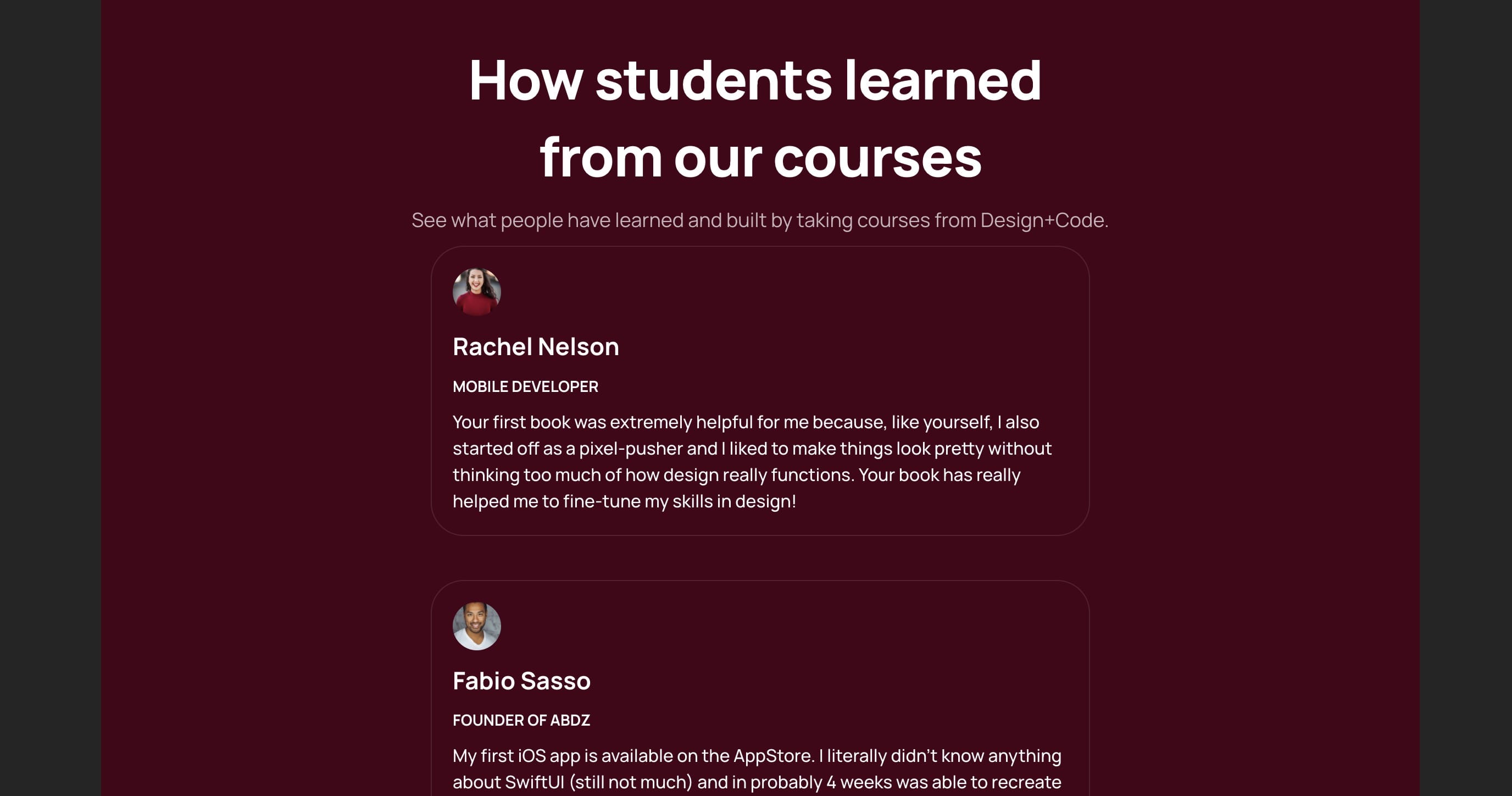
- Go to Insert → CMS Content. Choose Testimonials. Select Reverse.
- Select the Post Frame and remove frame (Cmd + Delete).
- Select the first item and set stack to vertical. Align left, Gap 12, Padding 20, Radius 30, Border white 10%.
- Select the Avatar, set size 44x44, radius 100%.
- Set Name to Section Title, Job to Caption 2 white and Text to Footnote white.
Grid Layout
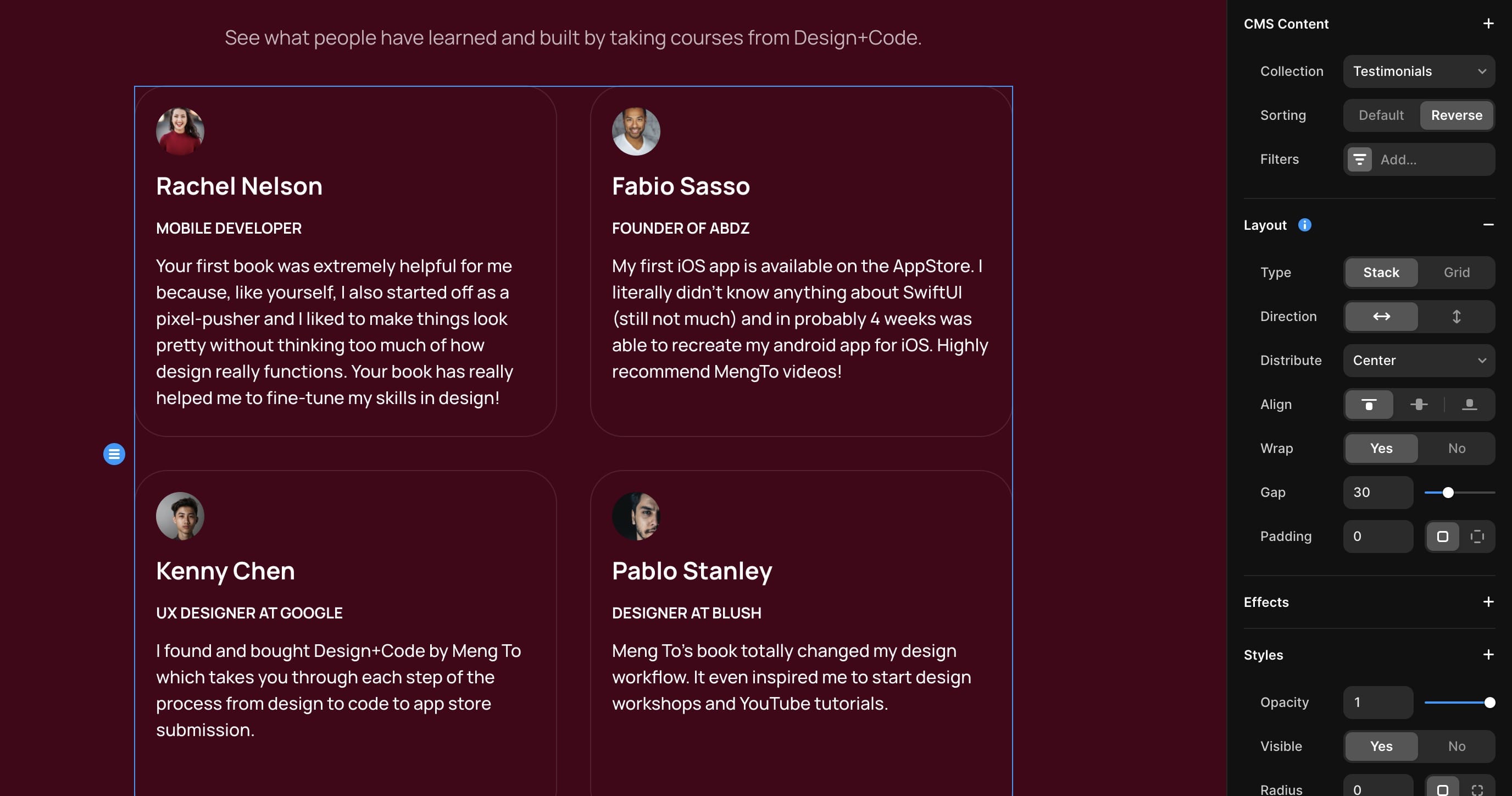
- Select the Collections List and set to Grid, width Fill, height Fit, Columns 2, Rows 2.
- Set MaxWidth 800, Gap 30.
- Select the first item and set height to 400 first, then to Fill.
- For iPhone, set Columns to 1.
- Select the Section and set Padding to 80, 20, 80, 20, Gap 30.## Updates
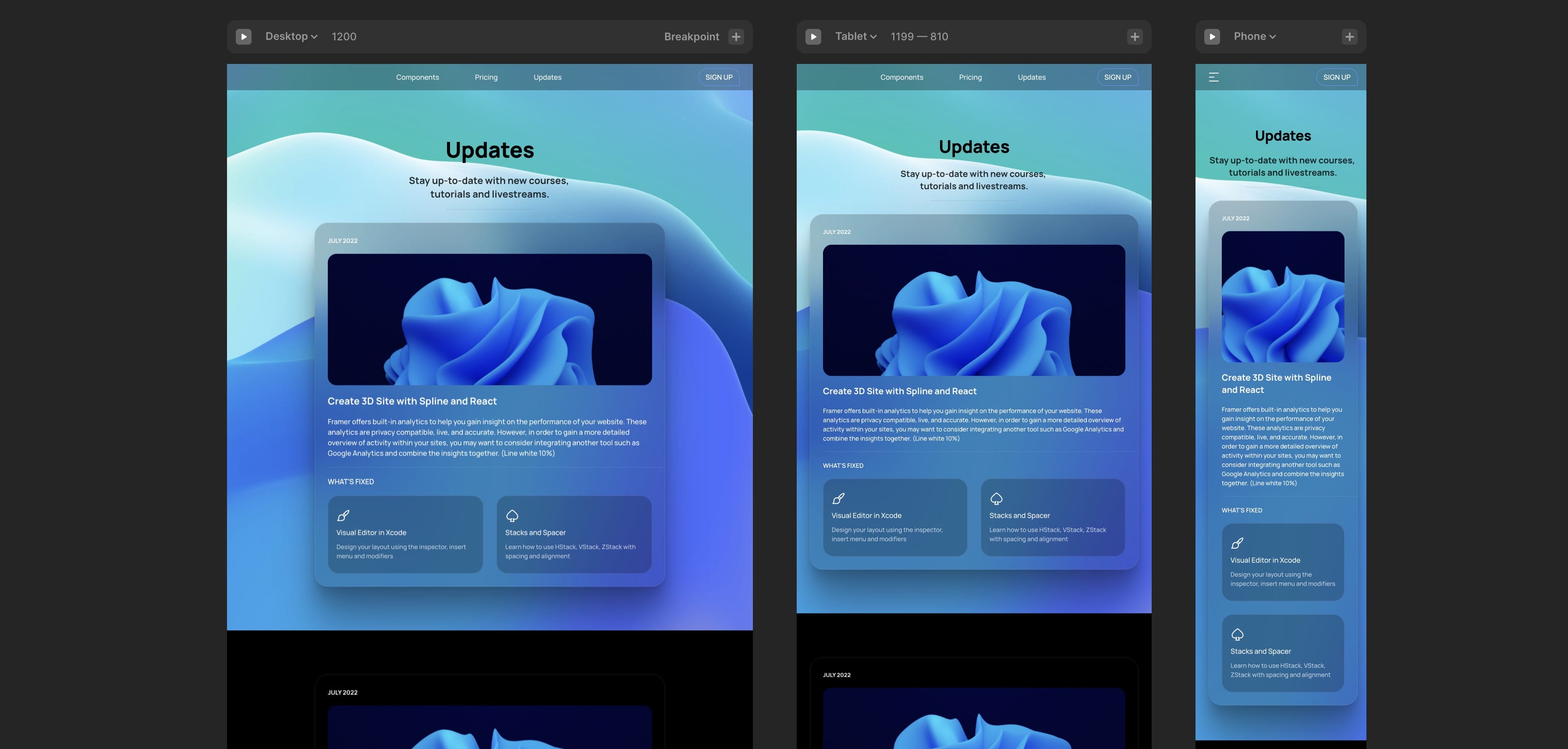
- Go to Updates and start with the following content:
(Caption 2)
July 2022
(Image Fillx300 Radius 20 3D Abstract by Simon Lee)
(Section Title Width Fill)
Create 3D Site with Spline and React
(Footnote Width Fill)
Framer offers built-in analytics to help you gain insight on the performance of your website. These analytics are privacy compatible, live, and accurate. However, in order to gain a more detailed overview of activity within your sites, you may want to consider integrating another tool such as Google Analytics and combine the insights together.
(Line white 10%)
(Footnote 2)
What's fixed- Select all elements and create frame. Rename to Update.
- Set width Fill, height Fit, Max Width 800, align left, gap 20, padding 30.
- Set Fill black 20%, border white 10%, radius 30.
- Set Bg Blur 30, Realistic Shadow Y 100 Diffusion 1.
Component
- Create the following items:
(Icon Paintbrush 32x32 white)
(Footnote width Fill) Visual Editor in Xcode
(Caption width Fill) Design your layout using the inspector, insert menu and modifiers- Select all items and create frame.
- Set width Fill, height Fit, align left, gap 10, padding 30, 20, 30, 20.
- Set Fill black 20%, border white 10%, radius 25.
- Create component Fix and set the values for Icon, Title, Text.
- Duplicate and change content:
(Icon Spade)
Stacks and Spacer
Learn how to use HStack, VStack, ZStack with spacing and alignment- Select both components and create Frame. Set width fill, height fit, direction horizontal, gap 30. On Phone, set direction to vertical.
- Select both components and set width Fill.
More Updates
- Select Desktop and set gap to 0.
- Add a new Section with a black Fill.
- Copy the Update frame and paste into this new section. Set width Fill.
- Select the section frame and set the width to Fill and height to Fit.
- Set direction vertical, gap 50, padding 100, 30, 100, 30. For Phone, set padding 80, 20, 80, 20 and set the Fix components to vertical.
- Change the content to:
June 2022
(Image Unsplash 3D Abstract)
Build an Animated App with Rive and SwiftUI
Design and code an iOS app with Rive animated assets, icon animations, custom layouts and interactionsFooter
Let’s finish this course by adding a footer to the site.
- Go back to Home and select Desktop. Add a new section called Footer.
- Set Layout, Fill to #070818, gap 30, padding 100, 30, 100, 30.
Link Components
- Insert Phosphor Icon Stack 30x30 white Duotone and text “Components”.
- Select both and create component. Set width and height to Fit, padding 8, 16, 8, 16, radius 10, Fill black 0%.
- Create hover and set Fill white 10%.
- Set Icon and Title variables.
- Duplicate 5 times:
CreditCard - Pricing
Files - Updates
DiscordLogo - Discord
YouTubeLogo - YouTube
InstagramLogo - InstagramLinks
- Select the first 3 links and create frame. Set width and height to Fit, align left.
- Select the other 3 links and create frame. Set width and height to Fit, align left.
Form
- Insert the following items:
(Caption 2) Subscribe to our newsletter
(Mailchimp form)
(Caption width Fill) Product updates, news and promotions. No spam ever.- Select all 3 items and create frame.
- Set width Fill, height Fit, Max Width 400, direction vertical, align left, gap 20, padding 20, radius 20, fill black 40%, border white 10%.
- Select Mailchimp form and set the width to Fill and Button Fill to #FF524F.
Footer Layout
- Select the Footer and set height to Fit, direction vertical.
- Select all three Rows and set create frame. Set width Fill, gap 30.
- Add a Line 25%x1, Fill white 10%.
Copyright
- Create 3 texts in Caption.
Copyright © 2022 DesignCode
Terms
Privacy Policy- Select all three items and create frame.
- Set width and height to Fit, gap 30.
Footer Component
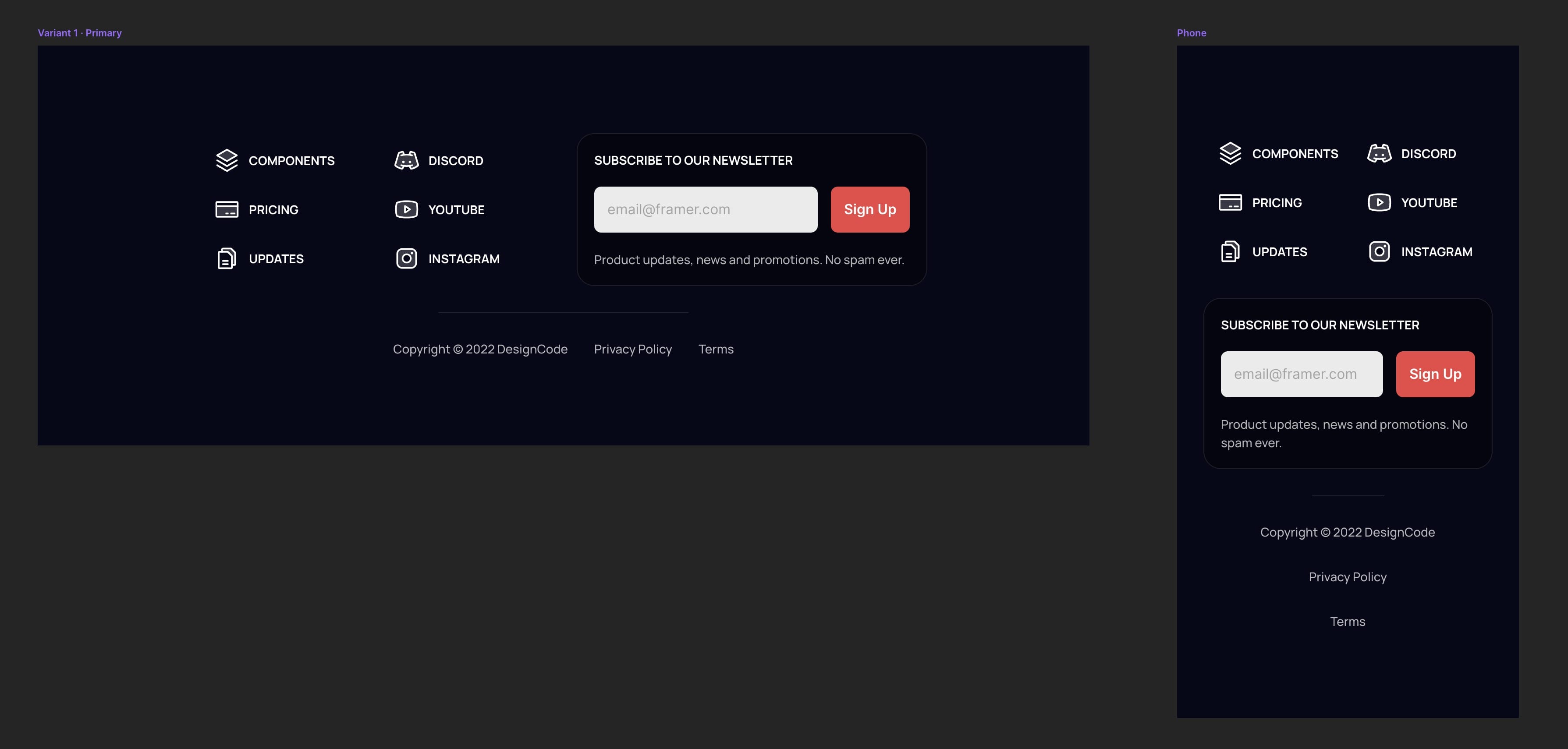
- Select the Footer and create component.
- Add a Variant called Phone.
- Set the Wrap to direction vertical and padding to 80, 20, 80, 20.
- Select the Links Rows and set the width to Fill.
- Select the Links Columns and create Frame. Set width Fill, height Fit, Max Width 400. Select the Columns width to Fill.
- Select the Copyright texts and set the direction to vertical.
- Finally, copy and paste the Footer component to every page. For Phone, set Variant to Phone.
Embed Component
If you find that loading a 3D asset is too heavy, you can always make it activate on click.
- Select the Embed and create component called 3D Asset.
- Insert and Image hero-bg.
- Insert a Button component, center, Variant 3: “Click to view in 3D”, Icon Cube.
- In Variant 1, set the Embed to Visible No, Button to opacity 0.
- In Hover, set the Button to opacity 1.
- Create Variant 2, set Embed to Visible Yes, Image to Visible No.
- Create a Connection on Tap from Variant 1 to Variant 2. Voila!
Conclusion
Finally, our site is done! I hope you had a lot of fun following this course. I have my own template that you can copy into your project and work from there: https://framer.com/projects/new?duplicate=jVScTJ0E7HJdoU7FGIie
We've learned so much about how Framer works, how to work with adaptive layouts, parallax effects, animations as well as creating a fully responsive site with multiple pages, components and CMS data.
I really enjoyed creating this course. I believe that Framer has a magical tool for creating a site that is familiar to a lot of designers who are using Figma and Sketch. I hope this experience is going to encourage you to create your own site. If you create something interesting give me a shout out on Twitter. I hope to see you in the next course!
Templates and source code
Download source files
Download the videos and assets to refer and learn offline without interuption.
Design template
Source code for all sections
Video files, ePub and subtitles
Videos
Subtitles
Assets
1
Build a 3D Site Without Code with Framer
Design and publish a responsive site with 3D animation without writing a single line of code
4:06
2
3D Animation and Text Styles
Make your layout adaptive for desktop, tablet and mobile and apply multiple text styles
11:56
3
Stack and Adaptive Layout
Learn how to work with Fill, Fit and spacing rules to keep your layout adaptive
17:06
4
Components and States
Design reusable and interactive components with variables and transitions
15:33
5
Top Bar Menu Animation
Create a custom hamburger menu with animation, variants and adapted for mobile
18:29
6
Scroll Parallax
Make an awesome parallax effect with elements moving at different speed
22:49
7
Appear Animation
Animate an intro with delay when the view appears and apply opacity, offset and 3D transform
17:03
8
Overlay and Forms
Design a signup modal that transitions over your current UI and add pricing cards to the site
17:58
9
Pages and Breakpoints
Link your buttons and components to multiple pages of your site
16:37
10
CMS and Content
Use the CMS to populate the content and collaborate with editors on the team
25:00
Meet the instructor
We all try to be consistent with our way of teaching step-by-step, providing source files and prioritizing design in our courses.
Meng To
I design, code and write
Meng To is the author of Design+Code. Meng started off his career as a self-taught designer from Montreal and eventually traveled around the world for 2 years as his US VISA was denied. During his travels, he wrote a book which now has 35,000 readers.
40 courses - 194 hours

Master AI Prompting for Stunning UI
Learn how to leverage AI tools like Aura for creating beautiful designs, working with templates, and experimenting with advanced prompts. A concise guide for designers and developers to level up their skills.
10 hrs
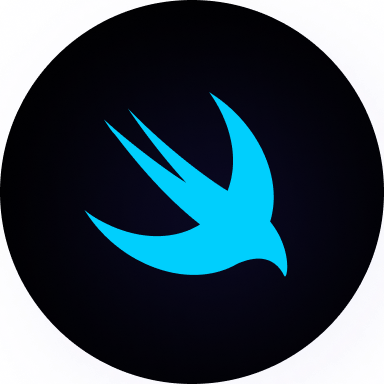
Build SwiftUI apps for iOS 18 with Cursor and Xcode
In this course, we'll explore the exciting new features of SwiftUI 6 and Xcode 16 for building iOS 18 apps. From mesh gradients and text animations to ripple effects, you'll learn how to create polished, highly custom apps using the latest workflows. We'll also dive into using Cursor and Claude AI for AI-driven coding, helping you start strong and customize your apps.
5 hrs

Create your Dream Apps with Cursor and Claude AI
Learn to build your dream web apps from the ground up using Cursor, Claude AI, and a suite of powerful AI tools. This course covers everything you need, including React for frontend development, Firebase for backend integration, and Stripe for handling payments. You’ll also dive into advanced AI tools like Claude Artifacts, Galileo AI, v0.dev for UI, Ideogram for design generation, and Cursor Composer for full-scale development.
6 hrs

Build a React Site from Figma to Codux
In this course, you'll learn to build a website from scratch using Codux, starting with a Figma template. You’ll master responsive design, collaborate with developers on a real React project, export CSS from Figma using Locofy, set up breakpoints with media queries, add CSS animations, improve SEO, create multiple pages with React Router, and publish your site. By following best practices, you’ll bridge design and development, improve your web design skills.
2 hrs

Create 3D UI for iOS and visionOS in Spline
Comprehensive 3D Design Course: From Basics to Advanced Techniques for iOS and visionOS using SwiftUI
3 hrs

Master No-Code Web Design with Framer
In this free Framer course, you'll learn to create modern, user-friendly interfaces. Start with dark mode and glass designs, then move from Figma to Framer, using vectors and auto layout for responsive websites. Add animations, interactive buttons, and custom components with code. Finally, you'll craft a design system suitable for teamwork or solo projects, all in a straightforward and practical approach.
4 hrs

Build SwiftUI Apps for iOS 17
In this course, we’ll be exploring the fresh and exciting features of SwiftUI 5! As we craft a variety of iOS apps from the ground up, we'll delve deep into the treasure trove that is SwiftUI's user interface, interactions, and animations.
4 hrs

Build Beautiful Apps with GPT-4 and Midjourney
Design and develop apps using GPT-4 and Midjourney with prompts for SwiftUI, React, CSS, app concepts, icons, and copywriting
4 hrs

Build SwiftUI apps for iOS 16
Create animated and interactive apps using new iOS 16 techniques using SwiftUI 4 and Xcode 14
5 hrs

Build a 3D Site Without Code with Framer
Design and publish a responsive site with 3D animation without writing a single line of code
3 hrs

Create 3D Site with Spline and React
Design and code a landing page with an interactive 3D asset using Spline and CodeSandbox
1 hrs

Build an Animated App with Rive and SwiftUI
Design and code an iOS app with Rive animated assets, icon animations, custom layouts and interactions
3 hrs

Build a SwiftUI app for iOS 15 Part 3
Design and code a SwiftUI 3 app with custom layouts, animations and gestures using Xcode 13, SF Symbols 3, Canvas, Concurrency, Searchable and a whole lot more
4 hrs

Build a SwiftUI app for iOS 15 Part 2
Design and code a SwiftUI 3 app with custom layouts, animations and gestures using Xcode 13, SF Symbols 3, Canvas, Concurrency, Searchable and a whole lot more
3 hrs

Build a SwiftUI app for iOS 15
Design and code a SwiftUI 3 app with custom layouts, animations and gestures using Xcode 13, SF Symbols 3, Canvas, Concurrency, Searchable and a whole lot more
4 hrs

React Livestreams
Learn how we can use React Hooks to build web apps using libraries, tools, apis and frameworks
4 hrs
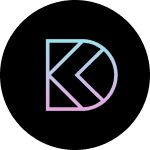
Design Founder Livestreams
A journey on how we built DesignCode covering product design, management, analytics, revenue and a good dose of learning from our successes and failures
2 hrs

SwiftUI Advanced Handbook
An extensive series of tutorials covering advanced topics related to SwiftUI, with a main focus on backend and logic to take your SwiftUI skills to the next level
4 hrs
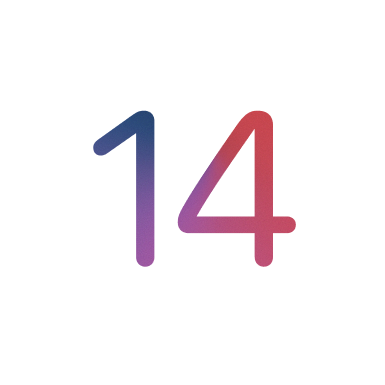
iOS Design Handbook
A complete guide to designing for iOS 14 with videos, examples and design files
2 hrs

SwiftUI Handbook
A comprehensive series of tutorials covering Xcode, SwiftUI and all the layout and development techniques
7 hrs

Build a web app with React Hooks
Learn how we built the new Design+Code site with React Hooks using Gatsby, Netlify, and advanced CSS techniques with Styled Components.
4 hrs

UI Design Handbook
A comprehensive guide to the best tips and tricks for UI design. Free tutorials for learning user interface design.
2 hrs

Figma Handbook
A comprehensive guide to the best tips and tricks in Figma. Not affiliated with or endorsed by Figma, Inc.
6 hrs

SwiftUI for iOS 14
Build a multi-platform app from scratch using the new techniques in iOS 14. We'll use the Sidebar and Lazy Grids to make the layout adaptive for iOS, iPadOS, macOS Big Sur and we'll learn the new Matched Geometry Effect to create beautiful transitions between screens without the complexity. This course is beginner-friendly and is taught step-by-step in a video format.
3 hrs

SwiftUI Livestreams
This is a compilation of the SwiftUI live streams hosted by Meng. Over there he talks and teaches how to use design systems, typography, navigation, iOS 14 Design, prototyping, animation and Developer Handoff.
19 hrs

UI Design Livestreams
This is a compilation of the UI live streams hosted by Meng. Over there he talks and teaches how to use design systems, typography, navigation, iOS 14 Design, prototyping, animation and Developer Handoff.
26 hrs

UI Design for Developers
In this course we'll learn how to use design systems, set up break points, typography, spacing, navigation, size rules for adapting to the iPad, mobile and web versions, and different techniques that translate well from design to code.
3 hrs

Build an app with SwiftUI Part 3
This course was written for designers and developers who are passionate about design and about building real apps for iOS, iPadOS, macOS, tvOS and watchOS. SwiftUI works across all of those platforms. While the code is not a one-size-fits-all, the controls and techniques involved can apply to all platforms. It is beginner-friendly, but it is also packed with design tricks and cool workflows about building the best UIs and interactions.
4 hrs

Build an app with SwiftUI Part 2
This course was written for designers and developers who are passionate about design and about building real apps for iOS, iPadOS, macOS, tvOS and watchOS. SwiftUI works across all of those platforms. While the code is not a one-size-fits-all, the controls and techniques involved can apply to all platforms. It is beginner-friendly, but it is also packed with design tricks and cool workflows about building the best UIs and interactions.
4 hrs

Build a full site in Webflow
Webflow is a design tool that can build production-ready experiences without code. You can implement CSS-driven adaptive layouts, build complex interactions and deploy all in one tool. Webflow also comes with a built-in content management system (CMS) and Ecommerce for creating a purchase experience without the need of third-party tools.
3 hrs

Advanced Prototyping in ProtoPie
ProtoPie is a cross-platform prototyping tool that creates prototypes nearly as powerful as those made with code, with half of the efforts, and zero code. It's perfect for designers who want to quickly experiment with advanced interactions using variables, conditions, sensors and more.
3 hrs

Build an app with SwiftUI Part 1
This course was written for designers and developers who are passionate about design and about building real apps for iOS, iPadOS, macOS, tvOS and watchOS. SwiftUI works across all of those platforms. While the code is not a one-size-fits-all, the controls and techniques involved can apply to all platforms. It is beginner-friendly, but it is also packed with design tricks and cool workflows about building the best UIs and interactions.
4 hrs

React Native for Designers Part 2
React Native is a popular Javascript framework that builds on top of React by using native components to create a real mobile app indistinguishable from one made using Xcode or Android Studio. The main difference with native development is that you get to use CSS, hot-reload, Javascript and other familiar techniques that the Web has grown over the past decades. Most importantly, you're building for both iOS and Android using the same codebase.
3 hrs

React Native for Designers
React Native is a popular Javascript framework that builds on top of React by using native components to create a real mobile app indistinguishable from one made using Xcode or Android Studio. The main difference with native development is that you get to use CSS, hot-reload, Javascript and other familiar techniques that the Web has grown over the past decades. Most importantly, you're building for both iOS and Android using the same codebase.
5 hrs

Design System in Figma
Learn how to use and design a collaborative and powerful design system in Figma. Design Systems provide a shared library of reusable components and guidelines and that will let you build products much faster
3 hrs

React for Designers
Learn how to build a modern site using React and the most efficient libraries to get your site/product online. Get familiar with Grid CSS, animations, interactions, dynamic data with Contentful and deploying your site with Netlify.
3 hrs

Swift Advanced
Learn Swift a robust and intuitive programming language created by Apple for building apps for iOS, Mac, Apple TV and Apple Watch
9 hrs

Learn Swift
Learn Swift a robust and intuitive programming language created by Apple for building apps for iOS, Mac, Apple TV and Apple Watch
4 hrs

Learn Sketch
Learn Sketch a design tool entirely vector-based and focused on user interface design
5 hrs

Learn iOS 11 Design
Learn colors, typography and layout for iOS 8
1 hrs
